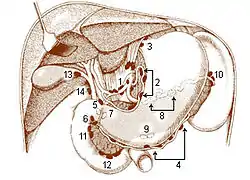Inferior pancreaticoduodenal artery
The inferior pancreaticoduodenal artery (the IPDA) is a branch of the superior mesenteric artery. It supplies the head of the pancreas, and the ascending and inferior parts of the duodenum. Rarely, it may have an aneurysm.
| Inferior pancreaticoduodenal artery | |
|---|---|
 The celiac artery and its branches; the stomach has been raised and the peritoneum removed. (Inf. pan. duo. a. visible at lower left.) | |
 Inferior pancreaticoduodenal is at #12. | |
| Details | |
| Source | superior mesenteric artery |
| Vein | Pancreaticoduodenal veins |
| Identifiers | |
| Latin | arteriae pancreaticoduodenales inferiores |
| TA98 | A12.2.12.054 |
| TA2 | 4253 |
| FMA | 14805 |
| Anatomical terminology | |
Structure
The inferior pancreaticoduodenal artery is a branch of the superior mesenteric artery. This occurs opposite the upper border of the inferior part of the duodenum. As soon as it branches, it divides into anterior and posterior branches. These run between the head of the pancreas and the lesser curvature of the duodenum. They then join (anastomose) with the anterior and posterior branches of the superior pancreaticoduodenal artery.[1]
Variation
The inferior pancreaticoduodenal artery may branch from the first intestinal branch of the superior mesenteric artery rather than directly from it.
Function
The inferior pancreaticoduodenal artery distributes branches to the head of the pancreas and to the ascending and inferior parts of the duodenum.[1][2]
Clinical significance
Aneurysm
Very rarely, the inferior pancreaticoduodenal artery may have an aneurysm.[3] It may be caused by certain medical interventions, major trauma, pancreatitis, cholecystitis, and vasculitis and other infections.[3] A ruptured aneurysm causes abdominal pain, and haemorrhage leads to hypotension.[3] It may be treated with open abdominal surgery.[3] It may also be treated with endovascular surgery, such as a coil.[3][4] These aneurysms represent around 2% of aneurysms in visceral arteries of the abdomen.[4][5] Pseudoaneurysm may also occur.[6]
History
The inferior pancreaticoduodenal artery may be more simply known by the acronym IPDA.[3]
Additional images
 Anatomical dissection showing the origin of the two inferior pancreaticoduodenal arteries
Anatomical dissection showing the origin of the two inferior pancreaticoduodenal arteries
References
![]() This article incorporates text in the public domain from page 607 of the 20th edition of Gray's Anatomy (1918)
This article incorporates text in the public domain from page 607 of the 20th edition of Gray's Anatomy (1918)
- Drake RL, Vogl W, Tibbitts AW, Richardson P (2005). Gray's anatomy for students. Philadelphia: Elsevier/Churchill Livingstone. p. 299. ISBN 978-0-8089-2306-0.
- Bertelli E, Di Gregorio F, Bertelli L, Civeli L, Mosca S (1996-06-01). "The arterial blood supply of the pancreas: a review. III. The inferior pancreaticoduodenal artery. An anatomical review and a radiological study". Surgical and Radiologic Anatomy. 18 (2): 67–74. doi:10.1007/BF01795221. PMID 8782310. S2CID 1993731.
- Kalva SP, Athanasoulis CA, Greenfield AJ, Fan CM, Curvelo M, Waltman AC, Wicky S (June 2007). "Inferior pancreaticoduodenal artery aneurysms in association with celiac axis stenosis or occlusion". European Journal of Vascular and Endovascular Surgery. 33 (6): 670–5. doi:10.1016/j.ejvs.2006.12.021. PMID 17276102.
- Peterson, Brian G.; Resnick, Scott A.; Eskandari, Mark K. (2003-12-01). "Coil embolization of an inferior pancreaticoduodenal artery aneurysm associated with celiac artery occlusion". Cardiovascular Surgery. 11 (6): 515–519. doi:10.1016/S0967-2109(03)00131-5. ISSN 0967-2109. PMID 14627975.
- Klonaris C, Psathas E, Katsargyris A, Lioudaki S, Chatziioannou A, Karatzas T (2013-02-24). "Multiple aneurysms of the inferior pancreaticoduodenal artery: a rare complication of acute pancreatitis". Case Reports in Vascular Medicine. 2013: 621350. doi:10.1155/2013/621350. PMC 3595677. PMID 23509663.
- Xu QD, Gu SG, Liang JH, Zheng SD, Lin ZH, Zhang PD, Yan J (September 2019). "Inferior pancreaticoduodenal artery pseudoaneurysm in a patient with calculous cholecystitis: A case report". World Journal of Clinical Cases. 7 (18): 2851–2856. doi:10.12998/wjcc.v7.i18.2851. PMC 6789396. PMID 31616702.
External links
- pancreas at The Anatomy Lesson by Wesley Norman (Georgetown University)